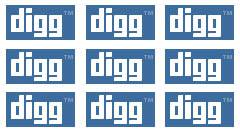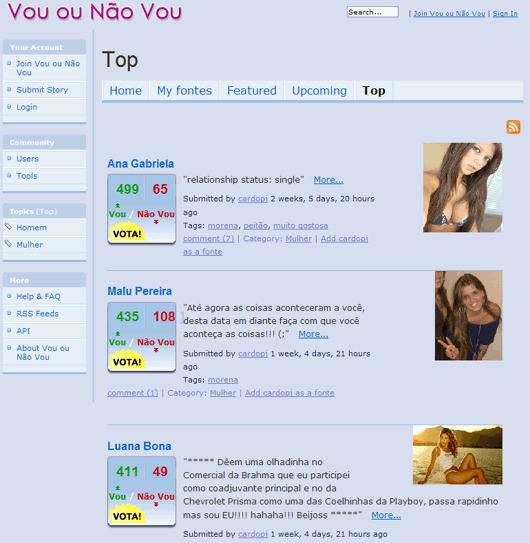Editor: This is a guest post by Rogelio Bernal Andreo, founder of CoRank – a service that lets you create you own custom
social network. Rogelio has a bee in his bonnet about the term ‘digg clone’, probably not
helped by the fact Read/WriteWeb called CoRank a “Create Your Own
Digg” site in May when it re-launched 🙂 But Rogelio is adamant that the term ‘digg
clone’ should be buried, so we’ve given him the floor to present his argument. Tell us
what you think in the comments.
There are a lot of people on the Net who don’t know what Digg is. But for those who do, there’s a term just as popular
as Digg: the Digg
clone.

Clones that never were
Has anyone ever heard Google being referred as an “Altavista clone”? What about Yahoo
Mail or GMail being mentioned as a “Hotmail-like site”? I’ve never seen anyone talking
about MySpace as a “Friendster clone”, and definitely WordPress.com would never be called
a Blogger-like site.
Was the new Google Groups a Yahoo Groups clone? During the portal craze a few years
ago, everyone was talking about portals – but we never heard that Lycos was a Yahoo
clone. Even today, you don’t often read that Metacafe is a YouTube clone, Google Reader a
Bloglines clone, or Google Blog Search a Technorati clone.
Although pseudo-copying has existed since day 1 on the net, the word “clone” hasn’t
often been used when we refer to sites with similar functionality/interface as those that
pioneered a particular service. Yet with the social news site Digg, we choked. We have
web pages, portals, video sites, blogs, search engines, wikis… and Digg
clones.
Clones that are
Pligg is an open source project that originally
copied almost all of the functionality and the user interface structure Digg had defined.
This caused many people to launch almost identical sites with little to no effort.
Moreover, most of these sites – Pligg-based or not – not only were a visual copy of
the Digg UI, they also tried to provide the same type of social news service. Either
international versions, or focusing on other niche topics. So those sites really are digg
clones. Same interface, same goals, same purpose.
But it was shortly after we launched coRank,
giving anyone the ability to create their own “social news/content network”, and seeing
how people were using it, that I realized there was something else going on.
Social News/Social Content Sites reaching mainstream?
While Digg is an extremely popular service, it really is a community. A very specific,
yet large and decentralized one. But because of that “communal” nature (mostly young male
techie), it has not yet reached mainstream – neither Digg nor the social news concept it
popularized. And chances are this concept will not reach the mainstream being described
as a “Digg clone”. Why? Not only does the mainstream not know what Digg is, the way many
people are using social news technologies has little to do with Digg itself.
Let a thousand flowers bloom
Yes, I see many people using coRank – or Pligg, or whatever – to create Digg-like verticals about any imaginable topic (and let me say I
see nothing wrong with that). But just as blogs or wikis earned their own name, I’m
seeing many other people taking this concept further than digg – where the term ‘clon’e
fades away in favor of a more distinctive type of site.
Some people are creating sites to add “social news” to their existing community.
They’re not adding this functionality to build a Digg killer or the next great niche
startup. All they care about is giving their existing community a tool that allows them
to share things that matter to them. That’s what drives them to submit things, not
hitting “the front page”.
But there’s a lot more than that. Let me list the ways ‘digg clone’ is unsuitable when
it comes to social news sites:
- Some people are building “clones”. No, not Digg “clones” but a different type – like
say HotOrNot-type sites such as this
one for the Orkut population (no nudity but might not be safe-for-work). Can you call
this “a Digg clone”? Perhaps. Can you say it’s “social news”? - Some experiment with it as a way to support their political
campaign (that particular site was created by the campaign team for Barack Obama, not
by just a fan of the Senator). - Others build a repository of articles related
to their industry – something you can already do with Del.icio.us and similar tools,
but now it’s completely customized and focused; and anyone can join in. You may see a
Digg clone, but what they have is a collection of articles, a group-specific bookmarking
site. - Some create a private area within their company as an “idea network exchange”, or as
a way to see what everyone in a specific company considers interesting, building a
private social bookmarking and intelligence tool. - And more than anything else, many people are building sites to aggregate content about a topic they like. Yes, it’d be
nice to see others contributing with their own content or votes, but that’s not the main
reason why these sites are built.
Not a Digg Clone
These are sites where their creators aggregate external content about specific topics,
and if other people feel like contributing, they’re welcome to do so. You could use other
tools to do this, but it’d be like using email to play chess – there are better ways. You
could use a blog, but blogs are mainly about publishing your own content; or a wiki, but
wikis are about collaborative editing; or del.icio.us, but that’s a global social
bookmarking service, not your own.
Yes, the mechanics or even the user interface of some of these sites may resemble that
of Digg. But their purpose and the way they’re being used is quite different.
Repositories, collective aggregators, personal sites, for-fun stuff… Who’s talking
about making the mighty “Front Page”? We can call them clones, but when we go and tell
the people who created them “that’s just another Digg clone” and they answer
“What’s Digg?“… that’s when the concept is entering mainstream. Digg, as a
concept, was a good first step; but there is a lot more.
Digg clone or HotOrNot clone? Definitely not social news!

Conclusion
Digg is the flagship of submitted/voted content, but adding categories or niches will
not transform it into the company that’ll bring social news into the mainstream. It will
mainly offer their existing community more things to do. But if you let people take
charge, do their own thing, reach their own groups and communities with their own
socially aggregated content functionality, then you’re talking social.
Yes, many of them really are clones, and that’s fine, but applying the term “Digg
clone” to anything based on submitting and voting content may degrade the fact that this
is a medium gaining popularity every day. It’s about communities and people using a new
concept to interact with third party content, generate more content, get engaged, etc.
While this was made popular by Digg, we might start considering it as a new type of site.
Personally I call them “Social Content Networks”, although the name is not important.
It’s something that will happen as the mainstream adopts the concept, something that’s
slowly already happening.

















